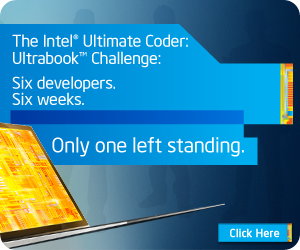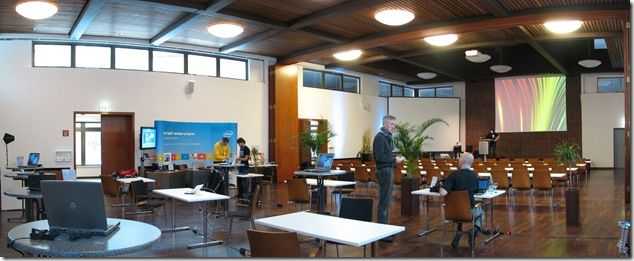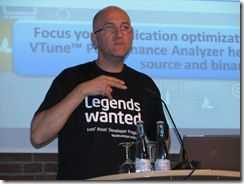If you aren’t following the Intel Ultimate Coder Ultrabook Challenge, tune in now because not only have we got 6 experienced software development teams creating applications for a new generation of Ultrabooks, not only is your Chippy one of the judges but we’ve got amazing new hardware to use for the competition too. You can get the latest updates on the competition here but right now I want to show you the exciting touch and sensor-enabled Ultrabook we’re using.
Tag Archive | "developer"

Previewing a Next-Generation Win 8 Ultrabook for the Ultimate Coder Ultrabook Challenge- Video
Posted on 21 August 2012

Ultimate Coder Ultrabook Challenge Week 1 – Developers Kick-Off with Hardware and Software Ideas
Posted on 14 August 2012
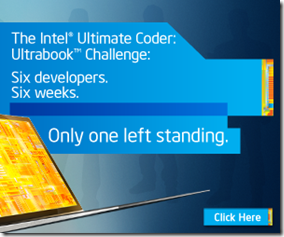 All 6 teams have now revealed what software they will be working on over the next 6 weeks for the Ultimate Coder Ultrabook Challenge and the chance to win $10,000. We’ll be following their progress which we hope includes methodology, tips and demonstrations. During September we’ll be meeting the developers and later in September we’ll be judging all entries on a next generation touch and sensor enabled Ultrabook.
All 6 teams have now revealed what software they will be working on over the next 6 weeks for the Ultimate Coder Ultrabook Challenge and the chance to win $10,000. We’ll be following their progress which we hope includes methodology, tips and demonstrations. During September we’ll be meeting the developers and later in September we’ll be judging all entries on a next generation touch and sensor enabled Ultrabook.
The Coders already have the Ultrabooks so we’ve also got our first chance to take a closer look at the hardware.
You can see a summary of what’s happening in the Ultimate Coder Ultrabook Challenge at any time by visiting this Intel portal.

The Intel Ultimate Coder Ultrabook Challenge is here!
Posted on 10 August 2012
6 teams of developers have been recruited to do something special, with a very special Ultrabook. The Intel Ultimate Coder Ultrabook Challenge has just kicked off and I’m extremely happy to say that I’m one of the judges who has to test all the software on a next-generation touch-enabled Ultrabook.
Over the next 6 weeks myself and three other experts will be watching closely and reporting on the progress of the 6 coding participants/teams; Lee, John, George & Suresh, Sagar, Shailesh and Andreas. One of them is going to win a bunch of cash but whatever happens, we’re going to get some good insights into the process and the type of software that is possible on a touch-enabled Ultrabook.

Stimulating Developers with the Ultrabook Platform
Posted on 20 July 2012
I was invited by Intel to meet some developers yesterday. The Intel Ultrabook developers meet-up in Munich was casual and informative. We all enjoyed hands-on with some of the latest Ultrabooks but the conversation about why Ultrabooks could be interesting for developers was, for me, more interesting.

Dell’s Project Sputnik Uses Ultrabook for Ubuntu-Based Developer Laptop
Posted on 08 May 2012
 Dell have just kicked off a project with
Dell have just kicked off a project with Ubuntu Canonical. Project Sputnik is a 6-month effort to try to pull together a solid Ubuntu build on a solid laptop, for developers. The Dell XPS13 has been chosen as the first target platform.
We’re constantly getting questions from developers about which Ultrabook to buy but the problems is the word ‘developers.’ I’m a developer myself but the only tool I use is VI as I hack my PHP and HTML for the Ultrabooknews product database. Other, more serious, developers need source code control, collaboration tools, compilers and integrated development environments. Project Sputnik is aiming to deliver a standard Ubuntu build (currently based on 12.04) and additional, downloadable profiles. So if you’re developing for the web, you might add in a web-focused profile. If you’re developing for Android, there could be a better profile for you.

Develop a Web App, Win one of 5 Ultrabooks!
Posted on 30 September 2011
We’ve given you a heads up (or two) about Intel’s AppUp application store wanting to expand into Ultrabooks. It’s a move that could even see some synergy in the Windows 8 Metro UI [Tenuous, Insider] and could be a serious earner for both Intel and developers but it needs seeding. That’s why Intel are offering prizes. In this case $250 for a Web app submission and and five chances to win an Ultrabook.
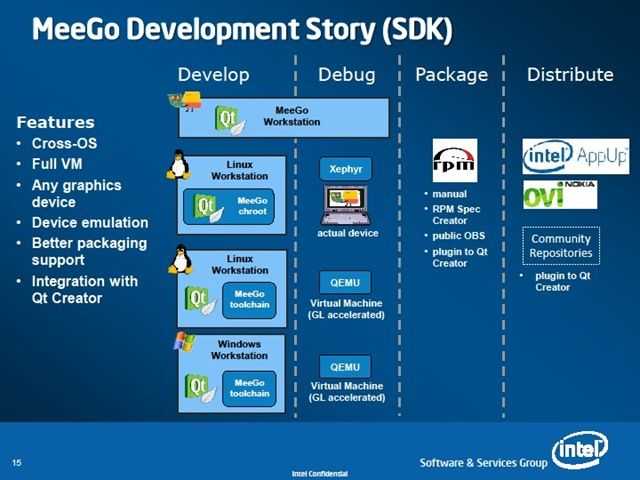
Intel AppLab Tour: London and Berlin Signal a MeeGo Catalyst
Posted on 06 December 2010
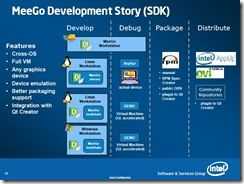 During a snowy week in Europe I travelled to London and Berlin to moderate the the AppLab events being run by Intel. I learnt more about the strategy and details but also got some interesting feedback and feelings from the atendees. For those of you not up-to-date with the Intel AppUp Developer Program (IADP) let me try to explain I’ve got time; A 5hr journey back from Berlin to Bonn! Skip the first section if you know the history.
During a snowy week in Europe I travelled to London and Berlin to moderate the the AppLab events being run by Intel. I learnt more about the strategy and details but also got some interesting feedback and feelings from the atendees. For those of you not up-to-date with the Intel AppUp Developer Program (IADP) let me try to explain I’ve got time; A 5hr journey back from Berlin to Bonn! Skip the first section if you know the history.
The story so far…
Intel have a strategy (a ‘continuum’ in their words) of mobile and embedded platforms based on the Atom CPU core that stretches way into the future. The new generation of Atom-based platforms start to move away from the traditional PC architecture in order to gain a foothold in the ‘always-on’ category of devices. Unfortunately, there isn’t a Microsoft OS product that works well with these platforms (a first for Intel?) so Intel have teamed with Nokia to build an open-source Linux core that if focused on mobility and fits with both Intel and ARM platforms. That OS is called MeeGo and it is under the care of the Linux Foundation. Meego implements a user interface layer using the Qt product that Nokia own. The Symbian Foundation also use this in Symbian. A basic application suite is being built along with reference UI models.In order to compete with similar mobile products, Intel is also building an application store framework with monetisation possibilities. Finally, there’s a marketing program aimed at seeding the applications. That’s the Intel AppUp developer program. Phew!
Intel Atom platform + MeeGo core + Qt layer + Apps + Appup monetisation for new apps + pot of gold to stimulate the whole stack.
MeeGo is clearly critical for Intel. It’s also critical for Nokia. They are public in saying that next generation smartphones, high-end products, will be based on Nokia. It scares me to think of the amount of money that is on the table here. It’s also interesting to note that AppUp is already available for Windows and targeted at netbooks, a category that is merging with laptops and getting less and less attention as time goes on. Marketing efforts for AppUp and MeeGo have just kicked off with the MeeGo Portal on the AppUp website.
What is AppLab?
We’ve seen The Intel Elements AppUp event in San Francisco (Sept. Report here) and the first joint effort for MeeGo in the MeeGo conference in November. Both were very big events. On a smaller scale, Intel’s regional offices are running their own programs in order to grow local developer interest and to make connections with ISV’s and finally, we get to AppLab, the events run by the Europe, Middle-East and Africa team (EMEA) who seem to be leading the local effort.
If you’re a developer interested in MeeGo and Intel’s new mobile platforms and opportunities, you definitely need to keep an eye out for events in your country. They are small, well-focused and bring some of the senior members of the teams to you. If you’re not interested in Atom, MeeGo and AppUp, then all I can say is that you need to keep an eye on it!
As you’d expect the events expand on what I’ve just summarised and go deep into explaining the MeeGo architecture, how AppUp works, what tools to use and what the platforms will be able to offer in terms of products. See below for links to the slides and a video stream.
London.
A slightly busy exhibition of mobile applications in London (Apps World, Olympia) meant that the crowd was largely transient although it was good to see a core of a bout 30 people stay and listen to the whole 4 hours of talks. The crowd were from various parts of the UK with about 30% developers and 30% marketing people. Presentation detail was good but speakers should definitely aim to pep-up and tidy-up their presentations. To be honest, as the moderator, there’s room for me to do the same! This is a critical product for Intel and that impression didn’t come across despite the obvious excitement from the speakers when in a one-to-one chat. Intel should also aim to bind the community together under some sort of interest group created for each event. With many people coming from London it makes sense to sponsor user-group meetings.
Berlin
The mood and setup was convivial, the church-hall location surprisingly well set-up. The sessions and speakers went from top to bottom and as deep as was needed and the small number of local people (about 25 at the Berlin event due to some terrible Europe-wide weather in the days running up to the event) helped to create a real atmosphere of community that should aim to keep connected in Berlin. The specialists brought across their subjects well although again, a measure of excitement needs to be injected. For those in Berlin that are interested in connecting to other users, check out Mobile Freidae, an independent website and community that has already held MeeGo get-togethers.
Use Local MeeGo Networks as connectors?
MeeGo, AppUp, IADP and the related products are new, interesting opportunities and Intel/Nokia really need the word to be spread. If you’re interested in setting up a local MeeGo interest group and covering AppUp, see the MeeGo Wiki.
New News
These events aren’t meant for major announcements but if you listen carefully, you can pick up a few hints.
- The IADP team is going to LeWeb in Paris, France this week. There was also a mention of new languages for AppUp. Add the two together for the answer!
- The MeeGo SDK is coming for Mac-based development to add to Linux and Windows-based environments.
- There’s a desire to make some of the (expensive) software tools low-cost or free for MeeGo devs. The Intel tools (compiler, libraries etc.) are very Atom and power-focussed. If this happens it’s a major advantage for Intel/MeeGo developers.
- I’m getting the feeling that AppUp for MeeGo is coming in Q1 2010. Certainly the marketing is ramping up already.
- There’s lots of prizes, support and free marketing available for early developers. More coming in 2011 (Bigger, apparently.)
- Dixons/Currys/PC World in the UK are ready to push a AppUp on their products; Right up into Laptops.
One thing that was easy to spot at the events was the interest in MeeGo. It’s not difficult to see why because the ecosystem for Windows is already mature and splintered. MeeGo is connected with a new, clear and mobile strategy. It’s new too which means there’s an excitement about being first. As we go into 2011, I expect the MeeGo/AppUp story to converge although it will be interesting to see how Nokia markets MeeGo/OVI. In theory, Qt provides a way to write an app and put it across both platforms but that message hasn’t really gone out yet and will be quite the marketing challenge as both sides look to promote their own developer opportunities. Will Windows+MeeGo be bigger than Symbian+MeeGo?
More events planned? MeeGo Roadshow!
I asked Stefan Englet, segment manager for EMEA at Intel about future Intel AppLab events…
We will continue doing “AppLabs” to give developers a full overview of the Intel AppUp Developer Program, the support they [can receive] and the opportunities for monetizing their applications. Additionally we will set up a MeeGo road show through central Europe, providing the latest about the cool new mobile OS – stay tuned, planned for 2nd quarter 2011.
The AppUp team is at LeWeb this week. Keep an eye out for Scot Appland and Peter Biddle, both senior members of the core AppUp team.
As for global activities, we’ll have a chance to catch up with the AppUp teams at CES in January so stay tuned here for more.
You can also check out this forum on the Intel Software Network for more event information.
All presentations from the event (PDF)
- Marketing overview
- MeeGo overview
- AppUp SDK details
- AppUp Validation process
- Intel optimisation tools
More information.
- End-user applications site: AppUp.com
- Developers should start here
- MeeGo / AppUp Portal is here and contains links to all the tools.
- AppUp forums at the Intel Software Network
- There’s also a site, MeeGo.com/Developers for the MeeGo-focused
- Video streams from the event are here and here. (Low-Q recordings of the live stream)
The AppLab events were fun and educational and really underline the importance of these products for Intel. Next update is expected in just four weeks at CES, Las Vegas.

Intel Serves up a Million Dollar plate of Atom Developer Temptation
Posted on 01 March 2010
 In a call with Intel last Friday we heard about a ‘Million Dollar Development Fund’ which should be officially launching right about now. (Should appear here.)
In a call with Intel last Friday we heard about a ‘Million Dollar Development Fund’ which should be officially launching right about now. (Should appear here.)
The fund is aimed at reducing the challenges that developers might have in developing for the Intel Atom Developer Program and it appears to be another part in an ongoing effort to seed the developer program.
The goal of the fund is to help accelerate innovation of software applications for Intel® Atomâ„¢ processor-based products, starting with netbooks and eventually supporting a variety of consumer electronics, including smartphones. With the netbook market segment set to grow from 35 million in 2009 to 139 million in 2013*, this new fund is designed to open up new opportunities for developers and independent software companies worldwide.
The Intel Atom Developer Program Million Dollar Development Fund represents Intel’s global commitment to support innovation by developers and software companies. The fund will be available to individual and student developers, as well as small, medium and large software companies to support the creation of new compelling applications and netbook user experiences. Hardware and financial aid also will be available to developers with the objective of reducing barrier to entry for new application development and accelerating time to market.
The first three elements of the development fund are available now with more to be announced over the coming months.
- Fast Track 2010: Developers want quick revenue and increased visibility. For 250 selected validated applications submitted between March 1-31, 2010, the developer or software company will receive $500. Talk about fast revenue!
- Download 2010: Revenue from one download is nice, but how about maximizing it? For 100 selected validated applications submitted between March 1-31, 2010, Intel will add to a developer or software company’s revenue on the Intel AppUp Center for 4 months (even for free apps).
- The Intel Atom Developer Challenge: This contest offers great prizes and marketing exposure for developers and their applications. Developers can join now at http://appdeveloper.intel.com/en-us/contest/developerchallenge, and watch for the announcement of more prizes on March 9, 2010.
So that means if even you developer a free app, you’ll get $500 when it’s approved and $2 per download. (Up to a limit of $5K for a free app. $25k for a paid app.)
It’s Windows-only right now but expect further announcements (and we get the feeling that more funds are set-aside) for the Moblin, sorry MeeGo-based app store soon. You should also see third-party app stores being built into OEM netbooks soon so there’s even more change that customers will download your app.
It’s a very interesting move by Intel and proves that applications stores are big business and costing millions and millions to get going. The next stage will be to convince the existing 40 million-plus netbook users to download and install the AppUp Center on their netbooks. Maybe if the apps are worth having, that stage will happen automatically!
 |
| |||
 |
| |||
 |
| |||
 |
| |||
 |
| |||
 |
| |||
 |
| |||
 |
| |||
 |
| |||
 |
|


